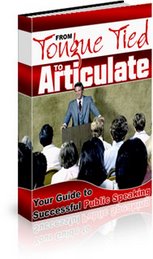Faye B. Roberts
Preparation techniques for public speaking is more than fact-finding or effective writing and then repeating the words by rote to your audience. Learning the more subtle skills like voice control and modulation, paper and equipment handling, posture and presentation, humor and timing, ease and confidence all require preparation.
Preparation techniques for public speaking includes practice, "real" practice, not just memorization. We're all familiar with the adage, Practice make perfect". But practice does not make perfect,Perfect Practice Makes Perfect.
Practice in front of a mirror 10 to 15 minutes a day, two or three times until the event. Practice speaking at the correct volume for the crowd and room size. You do not want to be overpowering or too faint to be heard.
Speak slowly and clearly. After reading a line, pause and look in the mirror, pretending you are looking at the audience, then return to your speech and repeat. To get immediate and realistic feedback, record your speech into a tape recorder and then listen critically.
You will hear where your strong points lie and the areas that need improvement. Doing that even once is worth ten silent read-throughs In the same way, one stand-up practice in front of friends and family members is worth ten read-alouds in front of a mirror. There will be nothing as helpful as practice and preparation to reduce or eliminate fear of public speaking. Practice, practice, practice.
Visualize your presentation in advance. Not only will your proficiency be increased by visualization, but so will your self confidence. Visualize yourself standing erect and proud, giving a flawless speech, the audience eager to hear every word. See yourself up on stage, fearless and powerful, connecting with your audience. Feel your pride. Hear the applause.
The fear of public speaking ranks high in the ratings of phobias. One of just many of the reasons for this is because of fear that someone in the audience may ask a difficult question after your speech, so anticipate and be ready with answers. There may of course be a question you haven't anticipated and don't know the answer to. Simply state, "I don't know, but I'll find out and get back to you". This will help eliminate your fear of 'unanswerable questions' and you can concentrate on your presentation.
Using these preparation techniques for public speaking will help to reduce or eliminate your stage fright. You've never learned how to do anything hard without practice, and speaking is the same way. Practice. You owe it to yourself and your audience.
--------------------------------------------------------------------------
Faye B. Roberts provides ways to overcome your fear of public speaking. Get a free report that will show you some little known secrets you can use right now to get on the fast track to public speaking success. Visit:
Get your Free Report Here
For a sure fired way to make yourself a effective public speaker visit
Make Me the Best Public Speaker
Monday, July 16, 2007
Subscribe to:
Post Comments (Atom)


3 comments:
Faye makes good points about fear of speaking. One point often overlooked is that speakers are afraid they are going to bore or disappoint their audiences. As it turns out, this is a legitimate fear because most speakers do bore and disappoint their audiences. The solution is not to “overcome fear” but to actually come up with an interesting speech.
In the radio business they have a saying "never be boring" and I guess that applies to speeches as well.
Learn how to be a Public Speaking Superstar!
Prospeke International, Professional speaker agency and bureau.In the radio business they have a saying "never be boring" and I guess that applies to speeches as well. Our business speakers are professionals in their field, delivering after Dinner speakers, keynote, workshop and conference presentations that are motivational, thought-provoking and educational for any event.
Post a Comment